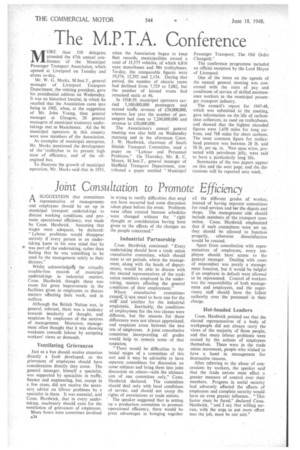Joint Consultation to Promote Efficiency
Page 52

If you've noticed an error in this article please click here to report it so we can fix it.
ASUGGESTION that committees representative of managements and employees should be set up in municipal transport undertakings to discuss working conditions and promote operational efficiency, was made by Coon. Hardwick. Assuming that wages were adequate, he declared: " Labour problems would disappear entirely if every person in an undertaking knew in his own mind that he
• was part of the undertaking, rather than feeling that he was something to be used by the management solely to their dictates."
• Whilst acknowledgdg the virtually trouble-free records of municipal undertakings in industrial matters, Coon. Hardwick thought there was room for great improvement in the facilities given to employees to discuss matters affecting their work, and in welfare.
Although the British Nation was, in general, tolerant, there was a tendency towards insularity of thought, and suspicion by employees of the motives of management. Moreover, management often thought that it was showing weakness towards labour by accepting workers' views or demands.
Ventilating Grievances
Just as a bus should receive attention directly a fault developed, so the grievances of employees should have consideration directly they arose. The general manager, himself a specialist, was supported by specialists in traffic, finance and engineering, but, except in a few cases, did not receive the necessary advice on labour problems by a specialist in them. It was essential, said Coun. Hardwick, that in every undertaking, machinery should exist for the ventilation of grievances of employees.
Many hours were sometimes involved A34 in trying to rectify difficulties that nee,d not have occurred had some discussion taken place before the event. Problems were often created because schedules were changed without the "right thought or consideration having been given to the effects of the changes on the people concerned."
Industrial Partnership
Coun. Hardwick continued: "Every undertaking should have a trade union consultative committee, which should meet at set periods, where the management, along with the heads of departments, would be able to discuss with the elected representatives of the trade union members employed in the undertaking, matters affecting the general conditions of their employment."
Where consultative committees existed, it was usual to have one for the staffand another for the industrial employees., Inevitably, the conditions of employment for the two classes were different, but the reasons for those differences were not always appreciated, and suspicion arose between' the two sets of employees. A joint consultative committee incorporating all grades would help to remove some of that suspicion.
"There would be difficulties in the initial stages of a committee of this sort and it may be advisable to have separate committees for discussion on some subjects and bring them into joint discussion on others—with the ultimate aim of one committee only," Coon. Hardwick declared. The committee should deal only with local conditions of service, and should not usurp the rights of associations or trade unions.
The speaker suggested that in setting up a production committee to promote operational efficiency, there would be great advantages in bringing together all the different grades of worker, instead of having separate committees for road services and for the depots and shops. The management side should include members of the transport committee. Coun. Hardwick emphasized that if such committees were set up, they should be allowed to function properly, otherwise dissatisfaction would be created.
Apart from consultation with representatives of employees, every employee should have access to the general manager. Dealing with cases of misconduct was purely a management function, but it would be helpful if an employee in default were allowed to be represented. Control of workers was the responsibility of both management and employees, and the supervisory staff should have the fullest authority over the personnel in their charge.
Hot-headed Leaders
Court. Hardwick pointed out that the elected representatives of a body of workpeople did not always carry the views of the majority of those people, and that many labour problems were caused by the actions of employees themselves. There were in the trade union movement, people who wished to have a hand in management for destructive reasons.
After referring to the abuse of concessions by workers, the speaker said that the trade unions must effect a greater measure of control over their members. Progress in social security had adversely affected the efforts of employees and complete security would have an even greater influence. "This factor must be faced," declared Coun. 1-lardwick, "and I say that willing service, with the urge, to put more effort into the job, must be our aim."




















































































